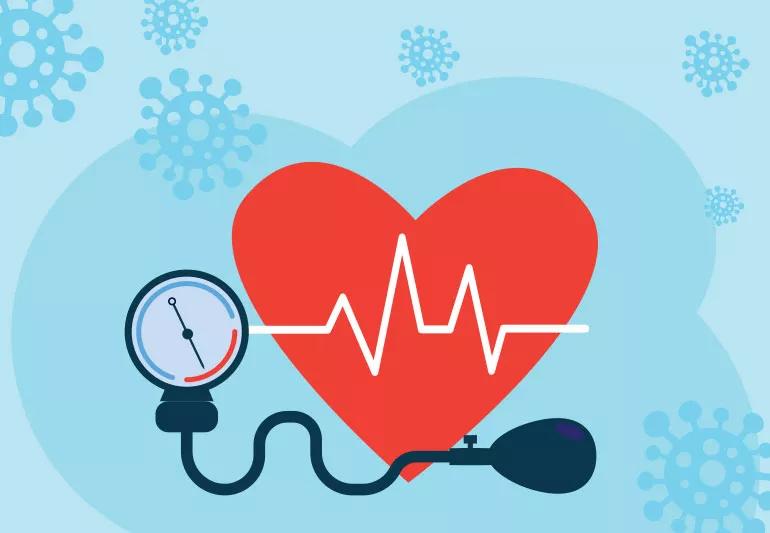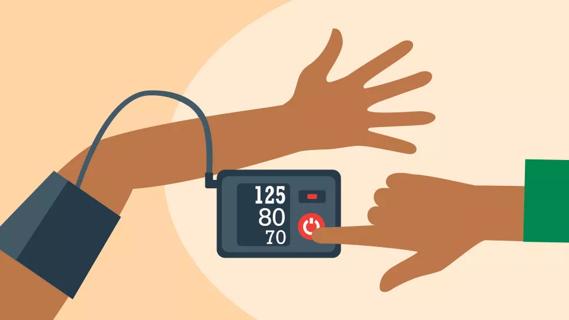And if yours has been a little higher, learn how to get it under control

Navigating the highs and lows of the new normal has affected our sleep, changed how we work and even taken a toll on our waistlines. But what about other vital signs like our blood pressure?
Advertisement
Cleveland Clinic is a non-profit academic medical center. Advertising on our site helps support our mission. We do not endorse non-Cleveland Clinic products or services. Policy
Has yours gone from perfect to slightly problematic within the last year or so? You’re not alone. Cardiologist Luke Laffin, MD, explains why this has been a common occurrence during the pandemic and shares some strategies for getting your blood pressure under control.
On December 6, 2021, a research letter was published in the American Heart Association’s (AHA) Circulation journal. The letter, titled, Rise in Blood Pressure Observed Among US Adults During the COVID-19 Pandemic, revealed the results of a study done by Cleveland Clinic and Quest Diagnosis. This study took a closer look at how recent events might have caused slight upticks in the blood pressures of participants in a variety of employee wellness programs across the country.
Participants needed to have their blood pressure taken by a healthcare professional for each year of the study (2018-2020). Researchers also included 2018 numbers for a better comparison of pre-pandemic blood pressure levels to pandemic ones. Of the 464,585 participants, about 54% were women and the average age was 46.
The study showed no significant differences in blood pressure between 2019 and January to March of 2020. From April to December of 2020, blood pressure numbers notably increased as compared to that same period in 2019. Changes ranged from 1.10 to 2.50 millimeters of mercury (mmHg) for systolic blood pressure and 0.14 to 0.53 mmHg for diastolic blood pressure.
Advertisement
These increases were seen among men and women of all ages and races. However, noticeable overall spikes in blood pressure occurred with women, while older people saw changes in systolic numbers. Some younger participants experienced changes in their diastolic numbers, as well.
Dr. Laffin was the lead author for the study and says that while it doesn’t have all of the granular data, the results still reveal a great deal about how the pandemic disrupted our health and wellness routines. This even included medication use.
“About half the population in the study had a diagnosis of hypertension, so those participants were likely taking some form of medication. We also know that other studies suggest that people didn’t fill their prescriptions regularly. That was a factor in addition to lifestyle changes. But it’s most likely both more than anything else.”
While a 1.1 or 2.5 mmHg increase might not seem much on an individual basis, Dr. Laffin says it can turn into a huge problem if everyone in the country is seeing those changes. And if left uncontrolled, high blood pressure can lead to an increased risk for strokes, heart attacks, kidney disease and other health threats.
If you’re seeing higher numbers because you weren’t taking your blood pressure medication regularly, then it’s time to get back on track.
“It should be a wake-up call to get back to your doctor and take your medications regularly. Now, some people may need to change their medication doses and they might need to start monitoring blood pressure more regularly at home. That’s really what the take-home message of this study is — don’t neglect your chronic medical conditions, especially cardiovascular disease.”
As we change, our medical conditions change. This is especially true when it comes to blood pressure. Dr. Laffin says it increases as we get older and that has to do with the stiffening of the larger arteries within our body. So, it’s very common to have to escalate therapy. If you’re taking blood pressure medicine, check in with your doctor to make sure you’re taking the right formula or dosage.
“Most people will not be on the same blood pressure medication regimen for a long time. It’s normal for a healthcare provider to make adjustments here and there. This can be attributed to our lifestyles. They don’t stay the same over time so neither will the medications we’re taking. So, medication changes often correspond with lifestyle changes,” Dr. Laffin explains.
Dr. Laffin says that stress could have slightly contributed to the elevated numbers.
Advertisement
“We know that elevated sympathetic activity, or periods when the sympathetic nervous system gets revved up, can increase blood pressure in some people for a short time. However, for some individuals, that can be a more chronic issue that ultimately leads to elevated blood pressure. Elevated blood pressure once in a while because of a stressful situation is not particularly harmful. But chronically, elevated blood pressures are worrisome.”
While the study didn’t examine this, the Centers for Disease Control and Prevention (CDC) has stated that high blood pressure could make you more likely to get severely ill should you contract COVID-19.
The American Heart Association says that elderly people with coronary heart disease or high blood pressure may be more susceptible to the coronavirus and more likely to develop more severe symptoms. This is also why it’s so important to make sure that your blood pressure is under control and that you’re checking in with your doctor as recommended.
High blood pressure doesn’t tend to cause symptoms so it’s always good to know where you stand. In addition to having your healthcare provider check it regularly, you can monitor it as well with a home blood pressure monitor.
Advertisement
Here are the ranges to be aware of:
“We don’t have symptoms from high blood pressure. It’s just there. The pandemic has been going on for almost two years now and we don’t know when it’s going to end. But we do know that uncontrolled hypertension and elevated blood pressure over the long term increases cardiovascular risk.”
It all comes down to lifestyle changes. We know the pandemic has stressed us out, cut into our sleep and most likely made us stress eat or drink a little more. Dr. Laffin says that by cleaning up our acts, we can help keep our blood pressure under control.
“I typically tell people that blood pressure management is about 70% lifestyle and 30% medications. Most people who take blood pressure medicines will need to take them because blood pressure doesn’t get better as we get older. But if we do the right lifestyle things — getting to an ideal weight, exercising and watching dietary sodium — those things can go a long way. Sleeping six to eight hours a night and moderating alcohol consumption can make a major difference as well.”
Advertisement
Learn more about our editorial process.
Advertisement

Foods high in potassium, calcium and vitamins C and E can help lower your blood pressure

Making lifestyle changes can help reduce your blood pressure, but taking cinnamon supplements probably isn’t one of them

Hypertension strains your heart and blood vessels, causing damage that can contribute to heart attacks

Elevate your BP by lying down, drinking water or cooling off

Daily stressors can increase BP in the moment, as well as contribute to habits that can feed long-term hypertension

Moderation is best when consuming caffeinated drinks to avoid unhealthy spikes in BP

Medication, exercise and diet changes can all help

An ideal blood pressure is less than 120 mm Hg systolic and less than 80 mm Hg diastolic

Wearing a scarf, adjusting your outdoor activities and following your asthma treatment plan can help limit breathing problems

Your diet in the weeks, days and hours ahead of your race can power you to the finish line

When someone guilt trips you, they’re using emotionally manipulative behavior to try to get you to act a certain way